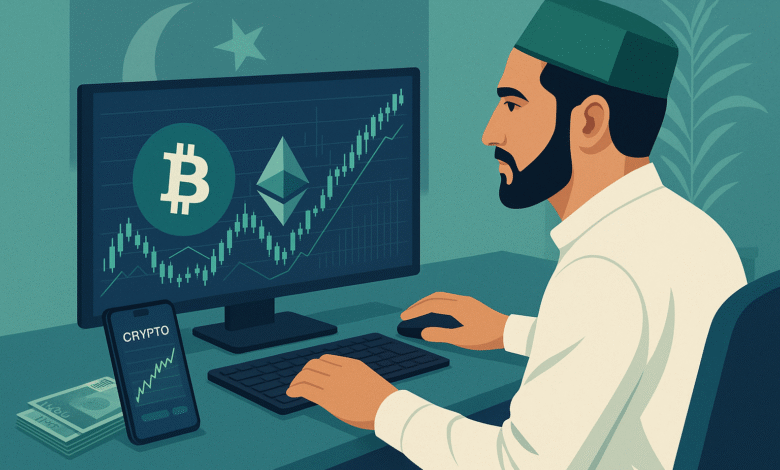Cryptocurrency Trading in Pakistan: Legal Status, Platforms, and Tax Implications

The world of digital money has reached Pakistan, and more people are getting interested in cryptocurrency trading in Pakistan. Bitcoin and other digital coins are becoming popular among Pakistani investors who want to try new ways of making money online. However, many people are confused about whether crypto trading is legal, which platforms to use, and what taxes they need to pay.
Pakistan’s journey with digital currencies has been bumpy. The government and banks have been careful about cryptocurrencies, sometimes warning people about risks. But things are slowly changing as more people understand how blockchain technology works and its benefits.
If you’re thinking about starting cryptocurrency trading in Pakistan, you need to know the rules, find safe platforms, and understand your tax duties. This guide will help you learn everything you need to know about trading digital currencies in Pakistan safely and legally.
Is Cryptocurrency Legal in Pakistan?
What the Government Says Now
The legal status of cryptocurrency trading in Pakistan is not completely clear. The State Bank of Pakistan (SBP), which controls banking in the country, has rules that make crypto trading tricky but not completely illegal.
In 2018, the SBP told all banks to stop helping people buy or sell cryptocurrencies. This means you can’t use your regular bank account to buy Bitcoin directly. But this doesn’t mean owning or trading crypto is against the law – it just makes it harder to do through banks.
The Securities and Exchange Commission of Pakistan (SECP) also watches over investments. They haven’t made specific crypto rules yet, but they warn people to be careful about scams and fake investment schemes.
How Things Are Changing
Pakistan’s government is slowly becoming more open to digital currencies. At first, they were very worried about risks. Now, they’re starting to see that blockchain technology could be useful for the country’s future.
The tax department (FBR) has said they want to track crypto trading for tax purposes. This shows they see it as a real business activity that should be taxed, not something completely banned.
What This Means for You
If you want to start cryptocurrency trading in Pakistan, you’re in a gray area legally. You can own and trade crypto, but you can’t easily use banks to convert your rupees to digital coins.
You need to be careful about following money laundering rules and know-your-customer requirements. The government wants to make sure people aren’t using crypto for illegal activities.
Also Read: Cryptocurrency Trading Strategies in Pakistan
Best Crypto Trading Platforms for Pakistanis
International Exchanges You Can Use
Even with banking restrictions, Pakistani crypto traders have many options. Several big international exchanges accept users from Pakistan and offer different ways to buy and sell digital currencies.
Binance is one of the most popular choices for Pakistani traders. It’s the world’s largest crypto exchange and offers peer-to-peer (P2P) trading. This means you can buy crypto directly from other users using bank transfers or mobile wallets like JazzCash and Easypaisa.
KuCoin is another good option that offers easy-to-use trading tools and many different cryptocurrencies. It’s great for both beginners and experienced traders who want to try different digital coins.
Huobi Global gives Pakistani users access to spot trading and advanced features. The platform focuses on security and follows rules in many countries, which makes it more trustworthy.
Local and Regional Options
Some regional crypto platforms understand the Pakistani market better. These exchanges often provide customer support in Urdu and accept local payment methods that Pakistanis are familiar with.
These local platforms work with money exchange companies and mobile wallet services to make it easier for people to buy crypto without using traditional banks.
Peer-to-Peer (P2P) Trading
P2P trading has become very popular in Pakistan because it helps people avoid banking restrictions. These platforms connect buyers and sellers directly, letting them negotiate prices and use different payment methods.
P2P trading offers good exchange rates and flexible payment options, including cash meetings and mobile wallets. However, you need to be more careful because there’s higher risk when dealing directly with other people.
Taxes on Crypto Trading
How Crypto Profits Are Taxed
The tax treatment of cryptocurrency trading in Pakistan is becoming more important as more people start trading. The Federal Board of Revenue (FBR) says crypto gains might be subject to income tax or capital gains tax.
If you buy crypto and hold it for a long time as an investment, the profit you make when you sell might be treated as capital gains. The tax rate depends on how long you held the crypto.
If you trade crypto frequently (buying and selling often), your profits might be treated as business income and taxed at regular income tax rates. This depends on how often you trade and whether trading is your main activity.
Keeping Good Records
You must keep detailed records of all your crypto trades to pay the right amount of tax. Write down when you bought, when you sold, how much you bought/sold, and the price in Pakistani rupees.
Keep records of transfers between wallets, trading fees, and any costs related to mining or staking crypto. These records will help you calculate your taxes correctly and prove you’re following the rules.
How to Stay Compliant
Pakistani crypto traders should talk to tax experts who understand both crypto and Pakistani tax laws. This helps you avoid problems and make sure you’re paying the right amount of tax.
Consider using crypto tax software that can track your trades across different exchanges and calculate your tax automatically. This makes the complicated process much easier.
Investment Opportunities and Popular Cryptos
Bitcoin and Major Cryptocurrencies
Bitcoin is still the most popular cryptocurrency among Pakistani traders. It’s like digital gold – many people use it to store value and as their first step into crypto trading.
Ethereum is the second most popular crypto in Pakistan. People like it because it supports smart contracts and decentralized apps (DApps). It’s also used for NFTs and DeFi (decentralized finance) projects.
Other popular cryptos among Pakistanis include Binance Coin (BNB), Cardano (ADA), and Solana (SOL). These offer different features and use cases.
New Opportunities in DeFi
DeFi (Decentralized Finance) has opened new ways for Pakistani crypto traders to make money. DeFi platforms let you lend, borrow, and earn interest on your crypto without using traditional banks.
Pakistani traders are getting interested in DeFi tokens and yield farming, where you can earn rewards by providing liquidity to platforms. However, these are riskier and more complex than simple crypto trading.
Managing Risk
Successful cryptocurrency trading in Pakistan requires good risk management. Don’t put all your money in one cryptocurrency – spread it across different coins and strategies.
Use position sizing (don’t risk too much on one trade), set stop-loss orders to limit losses, and regularly rebalance your portfolio. Only invest money you can afford to lose because crypto prices can change quickly.
Staying Safe and Secure
Protecting Your Crypto Wallet
Security is very important for Pakistani crypto traders because blockchain transactions can’t be reversed, and there’s limited protection if something goes wrong.
Hardware wallets are the safest way to store crypto. These are physical devices that keep your private keys offline and away from hackers. Popular brands include Ledger and Trezor.
Software wallets and mobile apps are convenient for active trading but need extra security measures like strong passwords and two-factor authentication. Don’t keep large amounts of crypto on exchange platforms – move them to your personal wallet.
Avoiding Scams
The crypto space in Pakistan has many scams targeting new investors. Common scams include fake investment schemes promising guaranteed profits and phishing attacks trying to steal your login details.
Be very careful of anyone promising guaranteed returns or asking for upfront payments. Real crypto investments don’t guarantee profits. Always research thoroughly before investing money.
Future of Crypto in Pakistan
Expected Rule Changes
The future of cryptocurrency trading in Pakistan depends on what rules the government makes. Experts think Pakistan will eventually create proper crypto regulations that provide clearer guidelines and better protection for users.
The government is becoming more interested in blockchain technology for various uses like digital identity and supply chain management. This suggests they might create friendlier rules for cryptocurrencies in the future.
Growing Market and Adoption
Despite unclear rules, more Pakistanis are adopting cryptocurrency. Young, tech-savvy people are especially interested in crypto trading as a way to join the global digital economy and protect against inflation.
The development of local crypto exchanges and services might speed up adoption by offering better user interfaces and local customer support.
Technology Growth
Pakistan’s improving internet and smartphone access creates a good foundation for crypto adoption. The growth of mobile payment systems like JazzCash and Easypaisa makes it easier to integrate digital assets.
Pakistani entrepreneurs are exploring blockchain solutions for local problems, which could create new opportunities for crypto trading and investment.
Conclusion
Cryptocurrency trading in Pakistan works within a complex system that requires careful attention to legal and tax rules. While there are challenges like banking restrictions and unclear regulations, opportunities for crypto investment continue to grow.
Pakistani traders should be cautious and focus on learning, managing risk, and following existing rules. Choose reputable trading platforms, use strong security measures, and keep proper records of all trades.
As rules become clearer and technology improves, cryptocurrency trading in Pakistan will likely become easier and more integrated into the financial system. However, traders must stay alert about rule changes, security threats, and market risks.
The future of crypto in Pakistan looks promising, but success requires continuous learning, careful planning, and following best practices in trading, security, and compliance. By staying informed and making smart decisions, Pakistani crypto traders can benefit from the opportunities in the digital economy while managing the risks involved.











